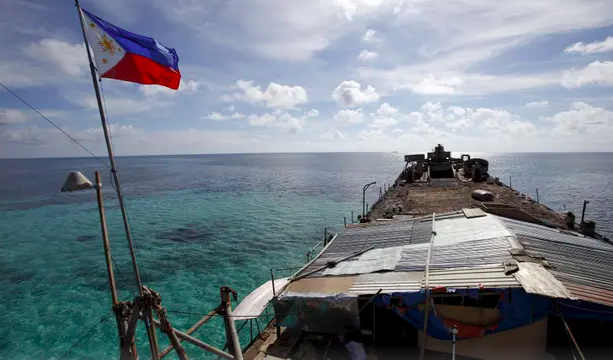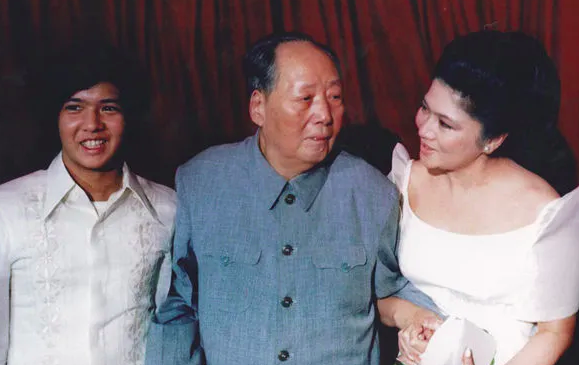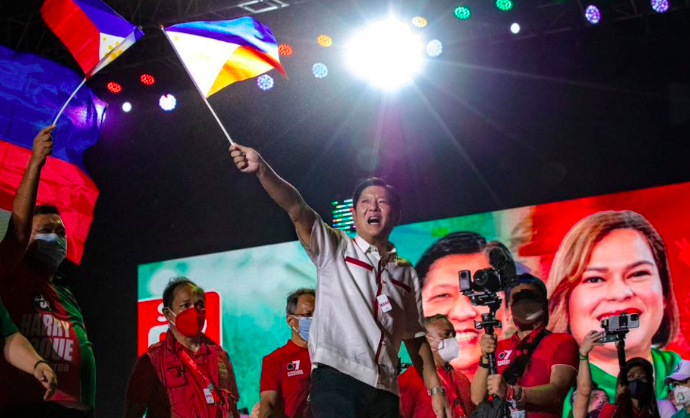Ferdinand “Bongbong” Marcos Jr., will become the 17th President of the Philippines on Thursday when he’s inaugurated at the National Museum of Fine Arts in Manila. Sara Duterté-Carpio, daughter of the incumbent president Rodrigo Duterté, was sworn in last week as Vice President with 32 million votes, the most for any office in Philippine history.
Each are the children of the Filipino dictators. The Philippine drug war, under President Rodrigo Duterté, aimed to "neutralize illegal drug personalities nationwide," and Duterté himself urged members of the public to kill criminals and drug addicts. While death tolls vary, officially 6,229 drug personalities have been killed as of March 2022, though human rights groups claim the death toll is over 12,000. Victims included 54 children in the first year.
Ferdinand Marcos Sr., who was deposed in 1986 following the People Power Revolution, was accused of embezzling billions when exiled to Hawaii. The Presidential Commission on Good Government has to date recovered $3.7 billion, less than half the family’s purported take.
The Philippine Islands have in fact a long and confounding history with colonialism. Spain (1565-1898) and the United States (1898-1946) occupied their island-nation for nearly 400 years, until the latter recognized their independence in 1948 with a caveat. The islands would trade and provide an exclusive military alliance to the U.S.
While the Republic of the Philippines has been a sovereign nation for the past 76 years — albeit wafting back and forth between nationalist dictators to democratically elected presidents — it can fairly be said that their history with colonialism informed their culture long before the west ever came along.
China’s Tributary System — a network of international trade, military cooperation and foreign relations — was China's de facto role of predominance in East Asia. The Tang and Song Dynasties, in particular, relied heavily upon the Philippines for trade routes where spice > silk > silver were traded along a 64,ooo kilometer super highway called the Silk Road.
Recently, the Philippines, on various issues, has been developing stronger ties and a successful Code of Conduct with China and ASEAN, a political and economic consortium of 10 members states in Southeast Asia. And despite having a warrant for his arrest in the United States, President-elect Marcos is scheduled to arrive at the 77th session of the UN General Assembly in New York City this September with political immunity. His message to the United Nations? Together, we shall rise again.
“Together, we shall rise again” may have been Bongbong’s presidential campaign slogan, but the enduring legacy of Chinese > Spanish > American colonialism was that it put political power into the hands of a select few. In the absence of strong political parties, “the family has become the main reliable collective mechanism,” says Professor Aries Arugay of the University of the Philippines. “This ritualistic kinship extends beyond blood relations to a far-reaching network.”
A Marcos stronghold in the north, and Duterté power base is in the south, make these heirs to Filipino dictators the perfect nepotistic couple. Their overlapping fiefdoms are now consolidated to control power. In principle and practice, the professor adds, “like the medieval ages.”

AP
Conspicuously absent from the Marcos campaign platform was foreign policy. A lacuna that’s particularly concerning given the critical issues affecting the country’s security and relationship with the U.S., China, and the Association of Southeast Asian Nations (ASEAN).
The Exclusive Economic Zone — those 200 nautical miles from any sovereign coastline — is the 1982 conclusion of the UN Convention of the Law of the Sea. “A sovereign state has special rights regarding the exploration and use of marine resources, including energy production from water and wind, that extends to 200 nautical miles from the coast of the state in question.”
China rejects Philippine sovereignty over this disputed territory, having laid claim to it in 202 BC, and outgoing Duterté has taken a non-confrontational approach toward China. In fact, he adopted an almost fatalistic attitude on the South China Sea issue, choosing instead to lean more on Beijing’s promise of trade + investments to the country. Marcos Jr. is reported to want to continue with Duterte’s friendly policy toward China and has declared that the country will “engage with China to the fullest.”
Unlike Rodrigo Duterté, who bore a personal grudge against the U.S. and was vocal about it, Marcos is a diplomat. His cosmopolitan background — Wharton Business School, St. Edmund Hall, Oxford — will make him less insular, more sophisticated in the Philippines’ approach to U.S.-China relations.
With pronouncements of returning the Philippines to its “past glory,” Marcos will be a participant in ASEAN meetings, adding the Filipino perspective to regional and global issues. Many foreign policy decisions will hinge on who he brings into his cabinet, and has already appointed himself to the post of Secretary of Agriculture! Forget about pineapples and bananas, the Philippines exported US $74 billion in 2021 — from electrical to copper, plastics and gems — and sent them sailing through the South China Sea.
Moreover, the Spratly Islands are an archipelago of 750 small islands, islets, cays, reefs and atolls widely scattered within 100 miles off the coasts of the Philippines. Combined, they have a scant land area, but their hidden value is oil, natural gas, and shipping routes.
While the Philippines are quick to claim an Exclusive Economic Zone of 1982 — an area within a 200-mile radius from a country’s baseline — it belies the fact that China has long since claimed the entire South China Sea. An ancient map from the Han Dynasty, over 2000 years old, sketched out and defined the limits of the Chinese kingdom which includes the Spratly Islands, and each and every single one of the 1.4 million nautical miles in the South China Sea.
Seventy percent of China’s present oil needs are imported. They're a veritable hostage to the demands of suppliers, and the risk of disruption could threaten China’s slowing economy. Elsewhere, energy and shipping revenue could eradicate hunger in the Philippines, a Marcos campaign platform and promise.
The Permanent Court of Arbitration in the Hague concluded in 2021 that "Second Thomas Shoal in the Spratly Islands is, or in its natural condition was, exposed at low tide and submerged at high tide and, therefore, does not generate an entitlement to a territorial sea, exclusive economic zone or continental shelf." According to the Hague, at least one shoal in the Spratly Islands belongs to the sea.

AP
As Ferdinand Marcos Jr assumes the presidency this week, in question isn’t his ascension to power or family connections. It’s if or whether he'll beget a better life for the Filipino people? Can he quell the nation’s concerns about dictators, protect human rights, advocate for democracy?
Moreover, can he ensure the country’s sovereignty and national interests against Chinese aggression? Or will he become a cliché, like Philippine President Gloria Arroyo — who stands accused of making back alley deals with Chinese oil companies to explore the disputed continental shelf in exchange for $2 billion in loans for Philippine infrastructure, including the ZTE Broadband deal?
Nearly 50 years ago, the president-elect watched his mother, former First Lady Imelda Marcos, ogled for her beauty by the Chairman of the Chinese Communist Party and founder of the PRC, Mao Zedong. Perhaps each state and nation — the highest and most enduring form of human social organizations — are a backgammon; administered by different ethics and codes of conduct? "Politics," Machiavelli wrote in The Prince, "are relative."
As Marcos + Duterté ascend Malacanang Palace this week, they do so as President-elect Gustavo Petro's Humane Party in Colombia ushers egalitarianism to the gateway of South America. As Bolivia's former president, Jeanine Áñez, is sentenced to 10 years in prison for leading a coup to depose her left-wing predecessor. And as the United States Select Committee listens to former Justice Department officials decry "a relentless pressure campaign from Donald Trump to overturn the 2020 Presidential election results."
The sun is setting on American imperialism, and as the world turns its head to the east we see amongst the oldest, most enduring civilizations in the world — the Philippines. Will they rise to rule their republic through democratically elected representatives, or follow dictators and corruption into the next inevitable coup?
When Napoleon returned from China he wrote, "Let China sleep. For when she wakes she'll shake the world." China may have seemed asleep in the 19th and early 20th centuries when ravaged by civil unrest, corruption, military defeats, famines, foreign occupations, communism and American and European colonialism.
But the Filipino people have lived alongside the Chinese for nearly 4000 years now and observe in a proverb, “Mahirap gisingin ang nagtutulug-tulugan.”
“It’s difficult to wake someone who is only pretending to be asleep.”
Archives










